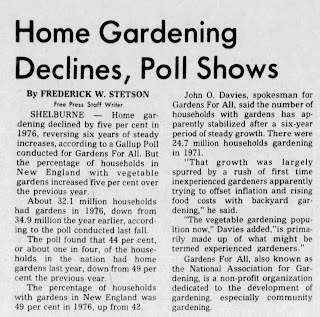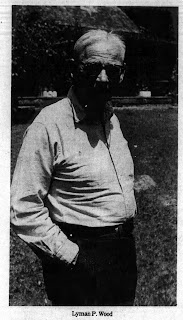BACG History Post #24
1977 was a year of transition for Gardens for All. The nonprofit began branding itself as "Gardens for All, The National Association for Gardening."A subtle shift in the American gardening landscape was simultaneously taking place. The 1976 Gallup poll showed that inflation had been the initial driver behind the boom in vegetable gardening. The 1977 Gallup poll revealed that outdoor recreation was a major impetus for people growing their own food.
The 1977 Gallup poll showed a decline in home vegetable gardening for the first time in six years. Gardens for All attributed the decline to attrition from the rush of inexperienced gardeners who planted gardens to offset inflation and high food prices.
Recognizing the need to educate and train garden organizers, step-by-step guidebooks were published in 1977 to support the community garden movement.At the federal level, Rep. George Brown of California introduced a bill in 1977 to support community gardening. The National Gardening Act was referred to the House Agricultural Committee, where testimony was taken. In testimony before Congress, Tommy Thompson said:
"Whenever a governor or mayor endorses a community garden program and offers some financial and material assistance, there is an enthusiastic move by community members to raise their own food; there is also the social change of the people themselves, the involvement of children, and the sense of pride among the community."
As Gardens for All transformed into a national organization, Garden Way Associates shepherded the nonprofit's growth. Lyman Wood served as chairman of Garden Way's board of directors.In 1976, the Garden Way board moved away from the standard corporate ethic of maximizing profits for shareholders. The board agreed to accept lower profits in order to fulfill the mission of bringing the "Garden Way" of living to as many people as practical.
As reported in a July 31, 1977 story in the Rutland Herald and Barre Times-Argus, Wood estimated that Garden Way Associates had put $200,000 into Gardens for All. He fully intended for that investment to boost the entire multi-pronged Garden Way enterprise.
"You get a lot of free publicity and much more mileage out of advertising, You get good will on the part of customers and prospects, who are then more inclined to buy from you, pay higher prices, pay in advance, and be more patient and understanding. You get a lot more cooperation from almost everyone in regard to almost anything you want to do," Wood said.


